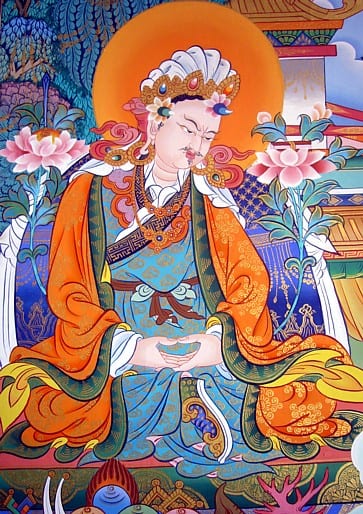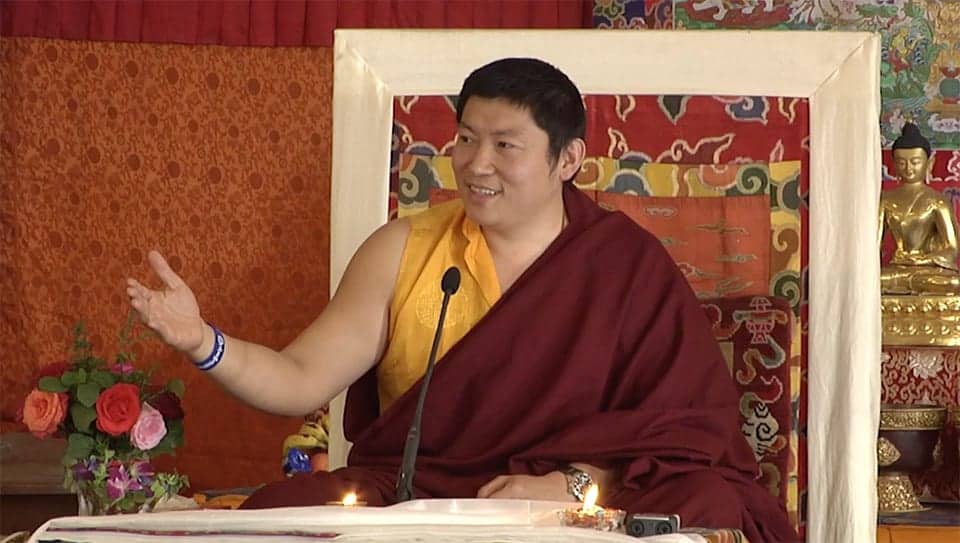Remembering the kindness of others serves as an important practice for all of us. We should not forget those many individuals who have been kind to us. But Phakchok Rinpoche warns us in this video teaching that it is very easy for us to forget kindness. That’s why we practice repeating over and over silently in our minds this reminder, “Don’t forget the kindness!” That is another example of ethical behavior and humane action. But if we lack this important aspect of ethics, we cannot see the importance of our parents. Additionally, without this reminder of kindness, we will not develop true compassion for our loved ones.
Remembering Kindness of Buddhas and Teachers
If we think we are Buddhist practitioners, how can we authentically supplicate the Buddha and the lineage masters without remembering their kindness? And how would we relate to our sangha members or our gurus? If we have this strong ethical base and remember their kindness, then we care very deeply. Because he sees this topic as so important, Rinpoche has taught on this topic many times, such as this example where he reminded us to read life stories.
Here, Rinpoche discusses how his teacher, Nyoshul Khen Rinpoche often mentioned the kindness of Guru Rinpoche and Khenchen Bodhisattva Śāntarakṣita.
As Dharma followers, we might even reflect sometimes on the kindness of the Buddha and these great masters. Rinpoche’s teacher explained about the great kindness of the Tibetan and Dharma patron King Trisong Deutsen.

When Rinpoche asked why we should think about the king’s kindness, his teacher reminded him that this king spent vast sums to invite great numbers of teachers and translators to Tibet. Because of the vast vision and great kindness and generosity of this king, Dharma was established in Tibet. We can still receive these teachings so many centuries later. Thus, remembering kindness is an action that is not limited to our present situation. If we investigate, we can see that we benefit from the great kindness of many beings from the distant past and many faraway places.
Remembering Kindness is Ethics
Appreciation of others’ kindness is an ethical action that can bear great fruit. If we don’t adopt these core humane, ethical values, how can we practice Dharma? We really need to be clear on this point. We have to be careful not to be hypocritical, pretending to be good practitioners when we forget these core basics. Rinpoche reminds us that we have come to learn Dharma in order to improve something. This is probably not a new teaching for most of us: we know that we should remember kindness. But knowing is not enough. We really need to do this! Practically, we can send messages to our family and friends as often as we can, even if we are far away.
Supplication: Way to Remember Kindness
Similarly, we should remember the kindness of our spiritual friends, our teacher, and our sangha. And we can really reflect on certain supplication prayers. In the video, Rinpoche explains his own devotion to the Künzang Dorsem Supplication (page 10) composed by Longchenpa. He remarks that this prayer is very important to him because it reminds him of the kindness of all those who brought and sustained the teachings. Rinpoche shares with us the way in which he personally supplicates, emphasizing what are the five main figures in Tibetan Buddhist history for him.
The Kindness of the Masters
Additionally, Rinpoche reminds us of the greatness of these founding teachers and translators who established authentic Dharma. As he tells some of the stories of their accomplishments, we can take the opportunity to feel gratitude. Finally, we can follow the express command of Guru Rinpoche himself who reminded his disciples to never forget him and always supplicate him. He and many other great masters left physical evidence of their feet and body prints to seal these promises for future generations of practitioners. We can choose to believe this or not, but many great masters have found inspiration in these signs.
Benefits
The kindness of past masters can allow us to feel the blessings in our own hearts. It makes us feel humane and respectful. Because of kindness, we make the effort to give gifts to others. Additionally, kindness makes other people happy while simultaneously developing us into responsible people. On the other hand, if we forget kindness, we show ourselves to be selfish people. We all know that we do not want to be selfish, right? So, with this reminder, we have the tools to change.










Responses